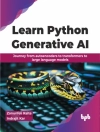This book brings together multi-disciplinary research and practical evidence about the role and exploitation of big data in driving and supporting innovation in tourism. It also provides a consolidated framework and roadmap summarising the major issues that both researchers and practitioners have to address for effective big data innovation.
The book proposes a process-based model to identify and implement big data innovation strategies in tourism. This process framework consists of four major parts: 1) inputs required for big data innovation; 2) processes required to implement big data innovation; 3) outcomes of big data innovation; and 4) contextual factors influencing big data exploitation and advances in big data exploitation for business innovation.
สารบัญ
Chapter 1. Big Data: the Oil of the New Tourism Economy.- Chapter 2. Composite Indicators for Measuring the Online Search Interest by a Tourist Destination.- Chapter 3. Developing Smart Tourism Destinations with the Internet of Things.- Chapter 4. Big Data in Online Travel Agencies and its Application Through Electronic Devices.- Chapter 5. Big Data for Measuring the Impact of Tourism Economic Development Programme: a Process and Quality Criteria Framework for Using Big Data.- Chapter 6. Research on Big Data, VGI, and the Tourism and Hospitality Sector: Concepts, Methods, and Geographies.- Chapter 7. Sentiment Analysis for Tourism.- Chapter 8. Location-Based Social Network Data for Tourism Destinations.- Chapter 9. Identifying Innovative Idea Proposals with Topic Models – A Case Study from SPA Tourism.- Chapter 10. Customer Data and Crisis Monitoring in Flanders and Brussels.- Chapter 11. Analyzing Airbnb Customer Experience Feedback Using Text Mining.- Chapter 12. Big Data as a Game Changer: How does it Shape Business Intelligence within a Tourism and Hospitality Industry Context?.- Chapter 13. Strengthening Relational Ties and Building Loyalty Through Relational Innovation and Technology: Evidence from Spanish Hotel Guests.- Chapter 14. Big Data and its Supporting Elements: Implications for Tourism and Hospitality Marketing.
เกี่ยวกับผู้แต่ง
Marianna Sigala is Professor in Tourism at the University of South Australia Business School, Adelaide, Australia. She is a widely published authority in the area of service operations management and information and communication technology (ICT) applications in tourism and hospitality. She also has an interest in e-learning models and pedagogies.
Roya Rahimi is Reader in Marketing and Leisure Management at the University of Wolverhampton. Her research interests are in CRM, organisational culture, human resource management, gender equality, and tourism higher education.
Mike Thelwall is Professor of Information Science and leader of the Statistical Cybermetrics Research Group at the University of Wolverhampton. He is also Docent in the Department of Information Studies at Åbo Akademi University, and a research associate at the Oxford Internet Institute. His current research field includes identifying and analysing web phenomena using quantitative-led research methods, including altmetrics and sentiment analysis, and has pioneered an information science approach to link analysis. He has developed a wide range of tools for gathering and analysing web data, including hyperlink analysis, sentiment analysis and content analysis for Twitter, You Tube, My Space, blogs, and the web in general.












